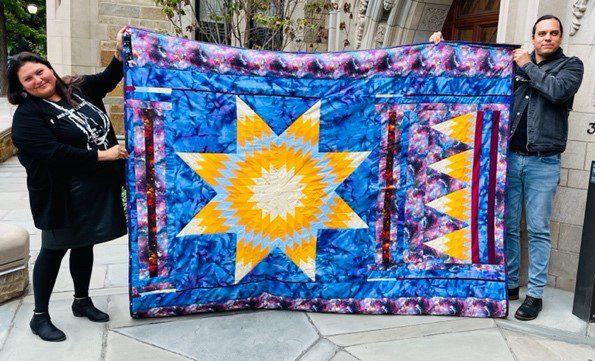Graduate students organize environmental ‘landscape studies’ conference
From Sep. 29 to Oct. 1, artists, academics and activists packed the Humanities Quadrangle to explore academic and popular understandings of landscape studies, as part of the “(Re)thinking Landscape: Ways of knowing / Ways of being conference.”

Courtesy of Yale University
The graduate student-organized “(Re)thinking Landscape: Ways of knowing / Ways of being” conference urged the Yale community to rethink their relationship to the environment through landscape studies — the study of the relationships between communities and landscapes.
Supported primarily by the Environmental Humanities Program, seven graduate students in the History of Art, Religious Studies, Architecture, Italian and Film and Media Studies departments organized the three-day conference. The conference consisted of tours of the Beinecke Rare Book and Manuscript Library and Yale University Art Gallery, panels, workshops with artists, keynote lectures and a film screening.
“Landscape is something that is central to my own work as a PhD student,” said Lydia Tuan GRD ’26, one of the organizers of the conference. “It’s a very contemporary and pressing topic for the moment.”
The conference centered around topics including the landback movement, Indigenous sovereignty and the invention of landscape in cinema.
One of the program’s first events was a screening of the film “Logos Zanzotto,” which was introduced by Tuan. The screening was followed by a conversation between City University of New York professor Silvia Carlorosi, Yale professor Francesco Casetti and the film’s director, Denis Brotto, who is a filmmaker and professor at the University of Padua in Italy.
The film, centering around the work of Italian poet Andrea Zanzotto, “addresses the question of how do you represent landscape on film and how does landscape transform after being represented,” Tuan said in an interview.
Zanzotto’s poetry, centered around themes of nature and landscape, is widely popular in Italy.
Tuan remarked that the event was the first time that the film had been screened at a “conference of this scale,” after having premiered at the Venice Film Festival in 2021.
Program attendees gathered for two keynotes — one on Friday, given by University of Minnesota professor Nick Estes, and one on Saturday, given by associate professor at Georgia State University Tiffany Lethabo King.
The Friday keynote, held in the lower-level auditorium of the Humanities Quadrangle, started with an introduction by organizer Royce Young Wolf, a postdoctoral associate.
“It’s very easy for us to lose sight of the seventh generation,” Young Wolf said, referencing Indigenous models of ancestral connection. “It’s very easy for us to lose sight of the fact that we are also the seventh generation as well.”
During Estes’ talk, attendees learned about the legacies and injustices of Indigenous boarding schools, histories of Indigenous environmental activism and Indigenous relationships with landscapes and ecosystems.
Estes discussed how the United States and Canadian governments oppressed Indigenous communities through administering these schools. In addition to the traumatic effects of these institutions on Indigenous youth and communities, Estes contended that these schools also gave the U.S. and Canadian governments “access to Native land and resources,” serving as an “early entry point of capitalism and extraction.”
Estes then detailed Indigenous activism, both in North America and globally, including the work of water protectors, land defenders and educators in protecting landscapes. He delineated how the work of these Indigenous activists was key to developing and disseminating frameworks of the Rights of Nature — a doctrine that grants the environment specialized legal rights.
In an interview with the News, Tuan said that organizing discussions for the conference commenced approximately a year ago. The organizers originally aimed to hold the conference in spring 2022, but postponed the conference date in order to ensure that the conference could be held fully in-person.
Tuan said that the attendees spanned a variety of disciplines, including landscape architecture, literary studies, film studies and social sciences. Presenters consisted of researchers and practitioners at various stages of their careers, from undergraduates to tenured professors.
While the conference was originally intended to span a single day, according to Tuan, an outpouring of interest, from researchers and practitioners from as far as Finland and Switzerland led to an expansion of the conference’s duration.
Over 300 papers were submitted to the conference, from which the program’s organizers selected 50 for presentation, which Tuan said was “rather selective” for a conference of this scale.
Tuan stated that the conference prompted her to think about how landscape studies and the themes of the conference are “more pressing and relevant” than she previously considered, because they were not something she considered to be a “hot topic” in her discipline.
She added that conversations at the conference would serve as starting points for future inquiry and collaboration.
The Humanities Quadrangle is located at 320 York St.







